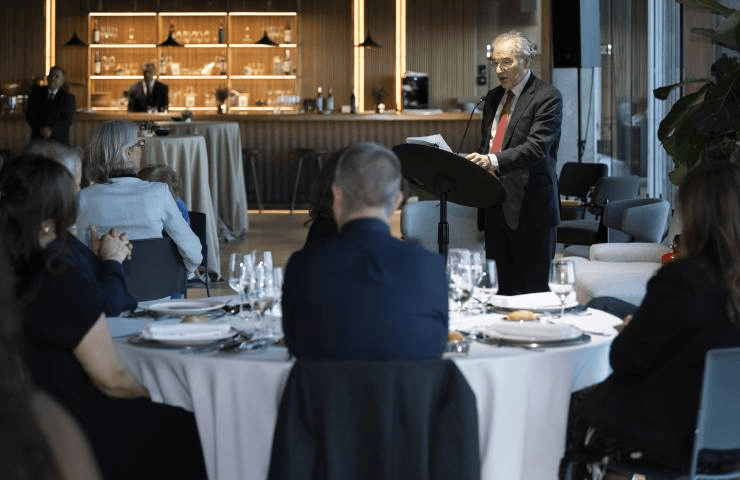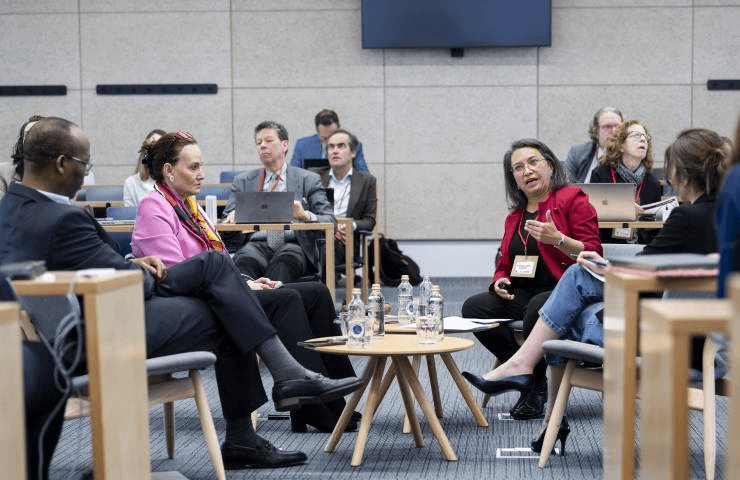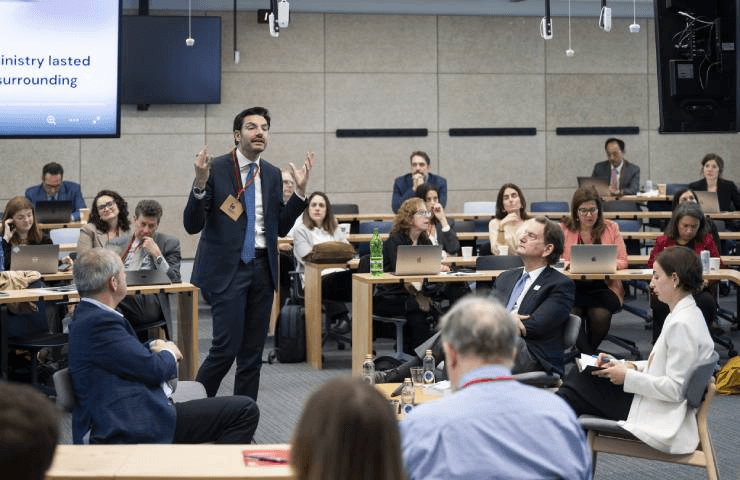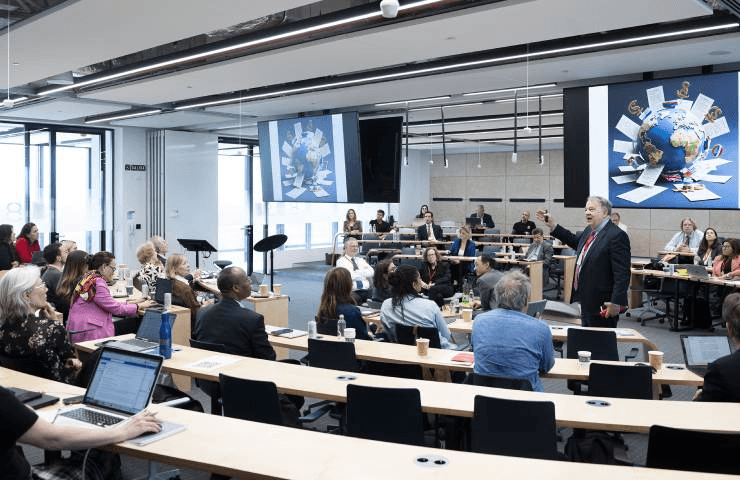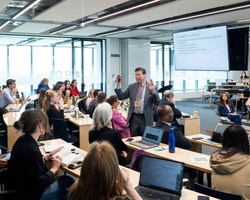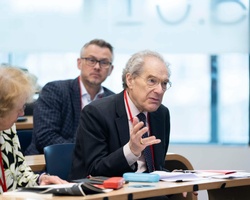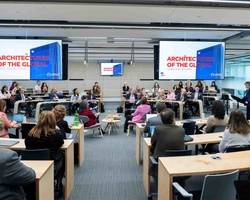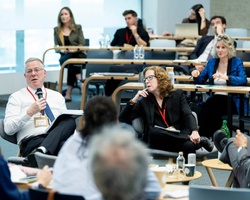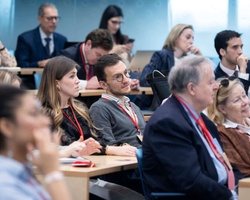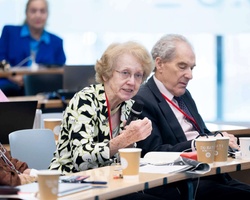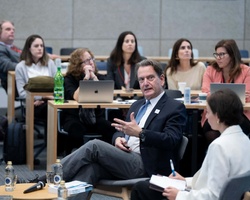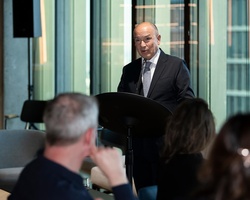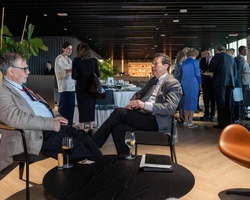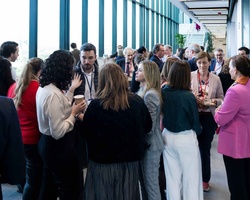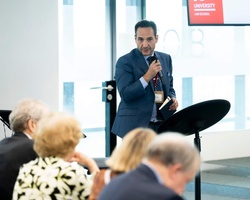- Home
- We Are Law School
- News
- Shaping The Future Of Global Legal Education At Ie Law School
Shaping the future of global legal education at IE Law School
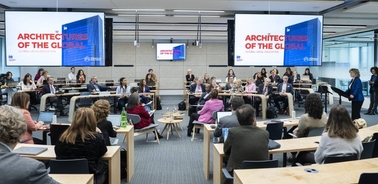
The second edition of "Architectures of the Global" brought together international experts to rethink legal education in response to today’s global challenges.
On April 10, IE Law School hosted the second edition of the international conference Architectures of the Global: Global Legal Education at the IE Tower in Madrid. The event convened a diverse group of thought leaders, educators, and professionals from around the world to explore how legal education must evolve to meet the challenges of Equality, Sustainability, Global Governance, and Digital Disruption.
Opening remarks were delivered by Soledad Atienza, Dean of IE Law School; Lord Jonathan Mance, former Deputy President of the UK Supreme Court; and Santiago Íñiguez, President of IE University, setting the stage for a dynamic day of reflection and debate.
Equality and Global Legal Education
The first panel, moderated by Federica Coppola, Assistant Professor of Criminal Law at IE Law School, delved into the critical role of legal education in advancing equality goals. The session explored how law schools can become catalysts for a more just and inclusive society, drawing on a range of perspectives and global experiences.
Eleonora Lozano, Dean of the Los Andes Faculty of Law, highlighted her institution's efforts to broaden access through initiatives such as the Pa’lante Pacífico and Pa’lante Caribe programs, which offer full financial support and mentoring to students from historically marginalized regions. She emphasized that legal education is inherently political and transformative, and that curriculum reform must reflect institutional commitments that extend beyond the classroom.
Mizanie Abate, Associate Dean for Graduate Programs College of Law and Governance Studies at Addis Ababa University, examined the multiple barriers that underrepresented groups face in accessing legal education. These include legislative discrimination against non-nationals, lack of accessible infrastructure, and the digital divide exacerbated by overreliance on online learning. He called for more inclusive and adaptive systems, especially for people with disabilities or people in remote or rural areas, to ensure that no one is left behind.
Closing the panel, Ruth Rubio, Professor of Constitutional Law at the University of Sevilla, reflected on the classroom as both a space of learning and a vehicle for democratic inclusion. She urged institutions to rethink educational content, spatial design, and the dynamics of speech, with special attention to gendered communication styles and intergenerational cultural differences.
Digital Disruption and Legal Education
The second panel, moderated by Francesca Palmiotto, Assistant Professor in Law and Technology at IE Law School, tackled the rapid technological changes reshaping legal education. The conversation centered on how law schools can responsibly integrate artificial intelligence and other digital tools into teaching and practice.
Marc Rotenberg, Founder of the Center for AI and Digital Policy, described 2024 as the “year of AI governance” and warned of the profound implications of AI for the legal profession. He emphasized that lawyers must remain accountable for the ethical use of AI, supervise its implementation, and disclose its use to clients to preserve trust and transparency.
Eugene Volokh, Gary T. Schwartz Professor of Law at UCLA School of Law, underscored the need for foundational writing skills before students can critically assess AI-generated content. He cautioned against overreliance on generative tools, which could lead to inadvertent plagiarism.
Antonio Aloisi, Associate Professor at IE Law School, advocated for a human-centered approach to digital transformation in legal education. Reflecting on the IE Lawtomation Jean Monnet Centre of Excellence, he proposed that AI should serve as a thematic platform for engaging students in critical thinking rather than as a mere classroom tool. He called for deeper, more reflective learning experiences that prioritize curiosity, mentorship, and social interaction.
Sustainability and Legal Education
Moderated by Verónica Ruiz Abou-Nigm, Chair Professor at Edinburgh Law School, the third panel focused on aligning legal education with sustainability imperatives. Panelists emphasized that law schools must not only incorporate ESG (Environmental, Social, and Governance) principles into their curricula, but also act as active agents of change.
Margherita Paola Poto, Research Professor of the Faculty of Law, UiT - The Arctic University of Norway, presented innovative teaching models rooted in positionality, transdisciplinarity, and co-creation. Projects such as ECO_CARE and the Ocean Incubator Network, promote experiential learning through collaboration with Indigenous communities and integral ecological frameworks.
David B. Wilkins, Lester Kissel Professor of Law Vice Dean for Global Initiatives on the Legal Profession and Director of the Center on the Legal Profession at Harvard Law School, explored the profound transformation of the legal profession over the last fifty years and the urgent need for law schools to adapt. He emphasized the tensions that legal education must navigate—between theory and practice, specialization and mobility, and academic versus professional training—and called for a model that is multidisciplinary, outward-facing, and rooted in empirical learning. For law schools to remain relevant, he argued, they must not only teach law, but also reimagine it as a tool for leadership, human connection, and global problem-solving.
Building on this, Sanja Bogojevic, Fellow and Professor of Law at Lady Margaret Hall of the Faculty of Law at the University of Oxford, proposed a paradigm shift toward environmental justice in legal education. She outlined four pillars—critical reflection, legal expertise, research-led teaching, and expanded legal imagination—as essential components of a forward-looking curriculum.
Hans Lindahl, Professor of Legal Philosophy at Tilburg University, concluded the panel by calling for “universities with soul and courage” capable of embracing sustainability as both an ethical and educational imperative.
Global Governance and Legal Education
The final panel, moderated by Eugenia Castrillón, Vice Dean of Programs at IE Law School, examined how legal education can address the growing complexities of global governance. Discussions focused on integrating transnational perspectives, developing ethical global practitioners, and fostering international collaboration.
David S. Law, E. James Kelly, Jr., Class of 1965 Research Professor of Law at the University of Virginia, noted that while globalization continues to evolve, it remains a permanent fixture of legal reality. He argued that global governance topics often fall into a pedagogical "discomfort zone," requiring law schools to embrace insights from political science, sociology, and anthropology to remain relevant.
Guy Seidman, Professor and Head of the LLM Program at Reichman University (formerly IDC) Herzliya, emphasized that law professors wear two hats: educators and global citizens. He asserted that academia must assert its place in shaping globalization—prioritizing public interest over corporate dominance—and create learning environments that nurture academic freedom and critical engagement.
Ray Campbell, Professor of Law at Peking University of Transnational Law, stressed the importance of immersing students in cross-border legal systems and advocated for global exchanges and international experiences as essential tools for preparing future lawyers.
Closing the panel, Toni Jaeger-Fine, Senior Counselor and Adjunct Professor of Law at Fordham School of Law, presented a comprehensive overview of cross-border legal education partnerships. From dual degrees and exchanges to joint legal clinics and virtual classrooms, she highlighted how collaborative programs can enhance institutional reputation, student opportunity, and global problem-solving capacity—while also confronting challenges like regulation of legal education, funding, and limited resources.
Closing Remarks
Bringing the conference to a close, Antonios Kouroutakis, Associate Professor at IE Law School, emphasized that legal education is more than a transfer of knowledge—it is a holistic process that encompasses theory, perspective, and professional skill-building. He announced that the insights from this edition will be compiled in a forthcoming publication and noted that the location for the third edition of Architectures of the Global is yet to be confirmed.
